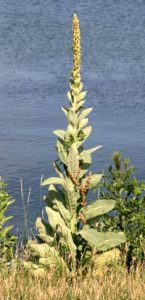Mullein: A Natural Wonder for Your Pet’s Health
Mullein, a centuries-old medicinal herb, is gaining recognition for its remarkable health benefits in the animal kingdom. This fuzzy-leafed plant, scientifically known as Verbascum thapsus, offers a wide range of therapeutic properties that can help improve your pet’s well-being. If you’re lucky enough, you might encounter mullein on country roadsides, as a volunteer plant in your garden or yard. And if you’re really lucky and it’s an emergency, mullein’s long, wide leaves are also known as “cowboy toilet paper”.

The beautiful mullein plant can grow 10′ tall with foot long leaves.
While it’s actually a pretty garden plant that grows quite tall, one of the primary benefits of mullein is its ability to combat respiratory issues in animals. Its potent anti-inflammatory and expectorant properties help soothe irritated airways, reduce inflammation, and clear mucus, making it an excellent remedy for coughs, asthma, and other respiratory ailments.
Mullein’s natural antiviral and antibacterial qualities make it a powerful ally in fighting infections. It can provide relief from ear infections in pets by reducing swelling and pain while eliminating harmful bacteria. Applying mullein-infused oil to your pet’s ears can make all the difference in their comfort and recovery.
Additionally, this versatile herb supports skin health by promoting healing and reducing inflammation. Mullein can be used to treat minor wounds, burns, and skin irritations in animals, offering a gentle yet effective alternative to harsh chemicals.
Incorporating mullein into your pet’s healthcare routine can greatly enhance their quality of life. However, always consult your veterinarian before introducing any new treatments. With the right guidance, mullein could be the natural solution your furry friend needs to thrive!
Mullein is easy to grow in your garden. The photo to the right depicts what to look for when you’re out and about. This plant is enormous so you’ll see it sticking up in ditches or along treelined paths. To see mullein’s beautiful flowers and long, long leaves, visit the University of Wisconsin’s horticulture website. (we also thank them for the photo!)
Dr. Jim & Cristen Carlson
Disclaimer: The content provided in the aforementioned blog post, including information about the medical benefits of mullein for animals, is intended for informational purposes only. It should not be considered as professional medical advice, diagnosis, or treatment. The use of any specific products or treatments mentioned in the post, such as mullein-infused oil, should not be undertaken without consulting a qualified veterinarian or other relevant medical professionals.
This blog post is not meant to promote or endorse self-medication or the use of any remedies without proper guidance from a licensed healthcare provider. The dangers of self-medication can include incorrect dosage, inappropriate treatment, or adverse reactions that may result in serious harm to your pet’s health. Always seek the advice of a veterinarian or another qualified healthcare provider with any questions you may have regarding your pet’s health or the use of mullein as a potential treatment option.
The author and publisher of this blog post expressly disclaim any responsibility for any liability, loss, or risk, personal or otherwise, which may be incurred as a direct or indirect consequence of the use and application of any advice, information, or recommendations contained in this post. By reading and/or acting upon the contents of this post, you acknowledge and agree to this disclaimer.
